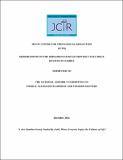Memorandum On the Implementation of Monthly Fuel Price Reviews in Zambia Submitted to The National Assembly Committee On Energy, Water Development and Tourism Matters

Date
2024-01-19Authors
Siamachoka, Muchimba
Harah, Brenda Tapiwa
Musonda, Lukwesa
Type
PresentationItem Usage Stats
155
views
views
161
downloads
downloads
Abstract
The surge in petroleum prices has added a new layer of complexity to Zambia's economic landscape. This surge in fuel costs has triggered a ripple effect across various sectors, compounding existing economic hardships and posing multifaceted challenges for the nation. The monthly review of domestic fuel prices means that domestic prices of petroleum products will heavily rely on the performance of international oil prices and the kwacha-dollar exchange rates which are currently extremely volatile. Thus, prices will rise whenever a rise is recorded either in the international oil prices or when the Kwacha loses value against the US dollar. Likewise, domestic fuel prices will decline whenever international oil prices reduce or when the Kwacha gains value against the US dollar. The increased prices of petroleum products have drastically elevated transportation costs. Zambia heavily relies on road transport for both domestic movements of goods and international trade. This surge in fuel costs has directly impacted the transportation sector, causing a domino effect across various industries. The resultant increase in the prices of goods and services has not only affected domestic consumers but has also impacted Zambia's competitiveness in the global market.
Description
In this memorandum submitted to the National Assembly Committee On Energy, Water Development and Tourism Matters, JCTR highlights the need for interventions aimed at protecting the livelihoods of the marginalised through mitigating the adverse effects of monthly fuel price reviews on the cost of production, cost of living and national food basket, ensuring the well-being of the Zambian population.